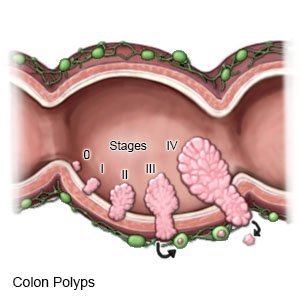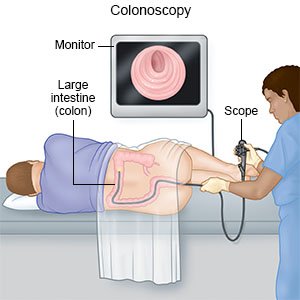Familial Adenomatous Polyposis
Medically reviewed by Drugs.com. Last updated on Mar 10, 2025.
What is familial adenomatous polyposis (FAP)?
FAP is a condition that causes multiple polyps to develop in your digestive system. Polyps are lumps of tissue that are usually benign (not cancer). Adenomatous polyps may turn into colorectal cancer if they are not treated. FAP greatly increases your risk for colon cancer. You also have an increased risk for other types of cancer.
 |
What causes FAP?
FAP is a rare, genetic condition. A genetic condition is one that you are born with. FAP is caused by a problem with a specific gene. The gene can be passed from a parent to a child. You may have the more common, classic FAP, or you may have a less common subtype. The type is based on how the gene is inherited and the number of adenomatous polyps that form. The number of polyps you have can range from fewer than 20 to hundreds.
What are the signs and symptoms of FAP?
You may have no signs or symptoms during the early stages of FAP. Over time, you may start to have some of the following:
- Blood in your bowel movement or bleeding from the rectum
- Change in bowel movement habits, such as diarrhea or constipation
- Abdominal or rectal pain
- Fatigue (physically and mentally more tired than usual)
- Weight loss that is not explained
What do I need to know about FAP diagnosis and screening?
Your healthcare provider may suspect FAP if you develop polyps at a young age. Tell your provider if you have a family history of FAP, colon cancer, or other cancer. Tell your provider when FAP or cancer was diagnosed. You may need screening as early as age 10 to 12, depending on the type of FAP you have. Screening means you are checked for polyps that may be cancer before you have signs or symptoms. You may be screened every 1 to 3 years. Any of the following tests may be used for diagnosis or lifelong screening:
- A genetic test may be used to check for the gene that causes FAP. You will have to provide a blood or saliva sample for genetic testing. Your parents, siblings, and children may also need genetic testing if you have FAP.
- A digital rectal exam means your provider inserts a gloved finger into your rectum to check for blood and polyps.
- A bowel movement sample may be tested for blood.
- A colonoscopy or sigmoidoscopy may be used to look at your colon. A tube with a light on the end will be placed into your anus, and then moved forward into your colon. Your provider may remove polyps to be tested for cancer.
- An endoscopy is a procedure to check for polyps or other cancer in your esophagus, stomach, and duodenum (small intestine). An endoscope is a bendable tube with a light and camera on the end. The endoscope will be passed through your mouth and guided into your upper intestine. Polyps may be removed and sent to a lab for tests.
How is FAP treated?
Currently, FAP cannot be cured. Lifelong screening may help find polyps or cancer early. You may need one or more of the following if a polyp or cancer is found:
- A polypectomy is a minimally invasive procedure to remove a polyp during a colonoscopy or sigmoidoscopy. Your healthcare provider may need to remove the polyp with a laparoscope. Laparoscopy is done by inserting a small, flexible scope into incisions made on your abdomen.

- Surgery may be needed if you develop cancer. Tissues or lymph nodes near a polyp may also be removed to prevent cancer from spreading. Surgery may be used to remove your colon to limit the number of polyps that may develop. An ileostomy may be created. An ileostomy is an opening that connects the upper part of your intestine (ileum) to the surface of your abdomen. You will need ongoing screening after surgery.
- Medicines may be used to decrease the number of polyps that form. Ask your provider if medicines are right for you.
Treatment options
The following list of medications are related to or used in the treatment of this condition.
What can I do to manage FAP?
- Do not smoke. Nicotine and other chemicals in cigarettes and cigars can damage blood vessels. This increases your risk for cancer and delays healing after surgery. Do not use e-cigarettes or smokeless tobacco in place of cigarettes or to help you quit. They still contain nicotine. Ask your healthcare provider for information if you currently smoke and need help quitting.
- Limit or do not drink alcohol. Alcohol can increase your risk for developing new polyps and cancer. It can make symptoms worse. Your provider can give you daily and weekly limits if you choose to drink. Ask your provider for information if you want to quit drinking and need help to quit.
- Eat healthy foods. Healthy foods include fruits, vegetables, whole-grain breads, low-fat dairy products, beans, lean meats, and fish. You may need to change what you eat during treatment. Do not eat foods or drink liquids that cause gas, such as cabbage, beans, onions, or soft drinks. Ask your provider about the best meals and snacks for you.

- Maintain a healthy weight. Ask your provider what a healthy weight is for you. Your provider can help you create a weight loss plan, if needed.
- Be physically active as directed. Ask about the best exercise plan for you. Physical activity, such as exercise, may improve your energy levels and appetite.

When should I seek immediate care?
- You see blood in your bowel movement.
- You vomit multiple times and cannot keep any food or liquids down.
- Your pain is worse or does not go away after you take your pain medicine.
When should I call my doctor or gastroenterologist?
- You have a fever.
- You cannot control your diarrhea or constipation.
- You are losing weight without trying.
- Your abdomen is swollen.
- You have questions or concerns about your condition or care.
Care Agreement
You have the right to help plan your care. Learn about your health condition and how it may be treated. Discuss treatment options with your healthcare providers to decide what care you want to receive. You always have the right to refuse treatment. The above information is an educational aid only. It is not intended as medical advice for individual conditions or treatments. Talk to your doctor, nurse or pharmacist before following any medical regimen to see if it is safe and effective for you.© Copyright Merative 2025 Information is for End User's use only and may not be sold, redistributed or otherwise used for commercial purposes.
Learn more about Familial Adenomatous Polyposis
Treatment options
Further information
Always consult your healthcare provider to ensure the information displayed on this page applies to your personal circumstances.
